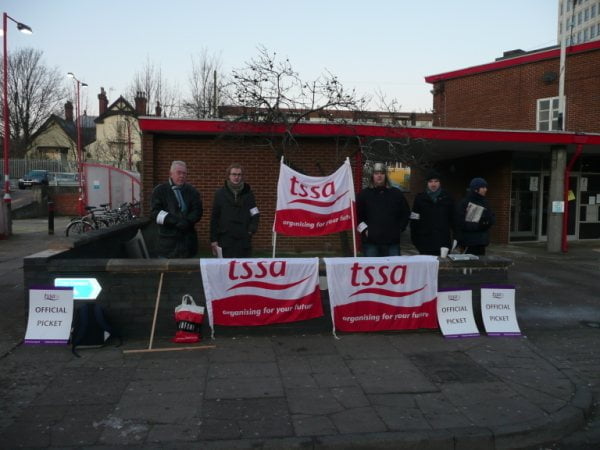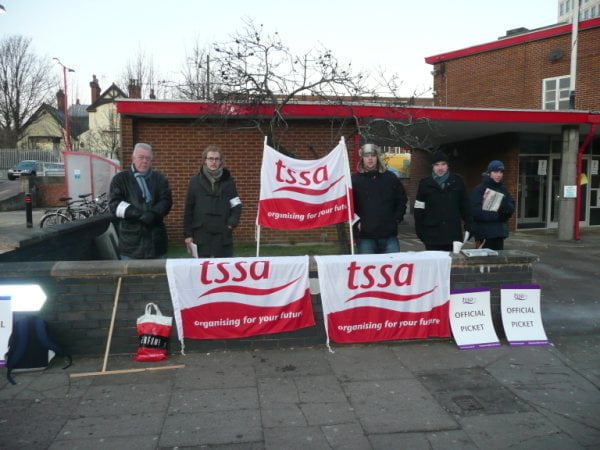The TSSA trade union, with 30,000 members in the UK and Ireland working
in the transport industry, is not known for militancy and industrial action,
yet on January 4th some 200 of its members working in rail industry
ticket offices up and down the country were out on their first ever strike and
picketing railway stations. A lack of consultation over new machines
as well as five stations being told last year they were to lose Travel Centres
and also ticket windows was the final straw. Industrial action was on the
cards.
 Originally, only four stations were planning to take action – Euston,
Originally, only four stations were planning to take action – Euston,
Coventry, Preston and Glasgow. Yet such was the feeling of anger amongst the
membership that eventually a dozen stations were involved along the Virgin
Trains West Coast Line that serves 25 million passengers a year.
The strike certainly had an effect. At Euston only 25% of ticket windows
were open. Virgin trains were advising
passengers to “board now and pay later.At two stations,
Oxenholme and Lancaster, the booking offices were closed completely. At Preston
and Crewe, there was a restricted service as managers from another rival
company, First Group, were used to keep them open. So much for “competition”
between different rail companies! In Coventry and Glasgow also, managers were
used to keep offices open. In other parts of the country the strike was solid
with TSSA members at Stafford, Stockport, Warrington, Runcorn and Wolverhampton
coming out in support.
This action has not been taken lightly or easily by
TSSA members, but they are at the end of their tether. Many of the members in
Coventry, for example, have been in the industry for decades and have built up
a rapport with customers by offering the best advice in terms of travelling
times and the best ticket prices, a service that they have to provide by law.
As rail passenger numbers have increased, the response of Virgin trains has
been to cut back on booking office provision so that frustrated passengers are
forced to use machines that offer reduced travel options and therefore dole out
more expensive tickets. On December 14th, for example, Sky News reported a
30-minute queue some 100 metres long at Coventry station due to an insufficient
number of booking office staff.
Passenger experience with the machines has not been
good and most tickets bought have been wrong with singles being bought instead
of returns or first class instead of standard class being bought. When such
mistakes happen the booking office staff have to issue refunds and then advise
passengers on the best options. The machines, therefore, rather than making
working life easier and more efficient, have added to staff duties. As a
Coventry TSSA spokesperson said, The complexity of tickets and
variety of cheaper type tickets does take time to unravel and management are
only concerned with the first class customer who brings in the most revenue. We
have certainly been breaking the Passenger Charters policy of dealing with
passenger queuing times and being served in less than 5 minutes during busy
times.”
In addition, the company has reduced the times when
off peak tickets can be used. Plans are in hand to ban off peak travel into
London before 11.30am in the morning and out again before 6.45pm in the
evening. At present cheaper travel is allowed after 10.55am and after 6.31pm.
All of these measures by the company are to reduce
costs despite the fact that anytime fares went up by 6% last Saturday, car park
charges increased by 50% last August and the company is receiving a taxpayer
subsidy of £1.4bn over 5 years. As a TSSA press release said about the strike, "This
is all about defending a vital service to rail passengers who are already being
ripped off with the most expensive fares in Europe.” The union has accused Virgin
Trains of cutting back on customer services “to boost their bottom line during
the recession” and has stated that it “the economics of the madhouse and it
should be stopped and replaced with a public service railway like they have in
the rest of Europe."
A Coventry TSSA spokesperson said that morale
amongst staff was at rock bottom. The company had relied in the past on staff
doing overtime on their rest days to cover staff shortages. Now, when staff
members finish their 8 hour 45 minute shift they can’t wait to get out of the
place. Staff members feel undervalued, overworked and highly stressed
and the company’s attitude is one of, “We don’t care”. There is a lack of
respect from managers and the company and they are only concerned in trying to
save more money. The company announced last year that there was a 30% increase
in passenger growth and reported profits of £104.5m up from £81.25m the
previous year. We also carried 1.5 m more passengers last year. The money from all
of this needs to be invested back into the stations and the workforce… and the tickets.
At the moment the extra revenue is lining the pockets of the shareholders.”
TSSA wants a commitment to the future of ticket
offices by replacing obsolete ticket machines with updated versions so that
jobs are protected and customer services maintained. A TSSA member said, "We want
all the ticket office machines returned to the Booking Office and Travel
Centres because the new ticket machines are not fit for purpose. All they do is
frustrate staff members and customers. It is yet another case of money being
spent by managers to introduce new technology without consulting those who will
use the new technology to see if it is fit for purpose."
TSSA also wants a fair deal for
staff so that they are remunerated for using new technology as on-board train
staff have been.
As was said by a TSSA member, “There is also a sense of
inequality between grades and in the case of drivers and other train managers
it is blatantly obvious.”
In addition TSSA wants shift cover so that ticket
office turns of duty are covered when staff are available to work overtime or
rest days and therefore customer service is maintained. When staff had worked
their normal working week and were on rest days, they had the choice of extra
work if there were shifts that had to be covered because of sickness or annual
leave. However, from July to September 2009 the company decided not to cover
for these absences in order to save money. This was done with no communication
or consultation with the trade union. A TSSA member commented, “The problem
could be overcome by filling all vacancies at the stations so we can continue
to give excellent service and quality customer care. This obviously means no
job losses. The present policy of unfilled vacancies means longer queues,
shorter opening hours and customer inconvenience.”
So far Virgin Trains have refused to commit to any
of these requests.
From the point of view of Socialist Appeal the
dispute raises a number of questions:
1. TSSA booking office staff have been forced into
taking strike action by the actions of Virgin Trains whose first duty is not to
their staff or the travelling public but to the shareholders and their profits.
2. TSSA booking staff have shown over a long period
of time that they want to provide the best possible service to passengers and
offer the best ticket prices amongst the myriad of possibilities that the chaos
of rail privatisation has caused.
3. TSSA booking staff are the experts in their
field and have years of experience in how the rail industry is run, or rather
should be run. New technology should be used to make working life easier for
all and to provide a better service to passengers, not as an excuse to cut
jobs.
4. The TSSA union is calling for a public rail service
like that in the rest of Europe. We agree. But we would add that such a service
can only be provided by the renationalisation of the rail industry under the
control of the workers in the industry, the wider trade union movement and the
government.
5. Given that before the privatisation of the rail
industry the subsidy to British Rail from the public purse was around £1bn per
year, and given that the present taxpayers’ subsidy to the privatised rail
industry is around £6bn per year when private companies are alleged to be more
efficient than public ones, Socialist Appeal calls for the renationalisation of
the industry with no compensation except on the basis of proven need.
TSSA members will now be meeting up and down the
country to assess the success of the strike and to plan for future action if
their requests to the company are not met. The wider labour and trade union
movement should offer all possible assistance to ensure that the action results
in success and the service to the travelling public is maintained.






